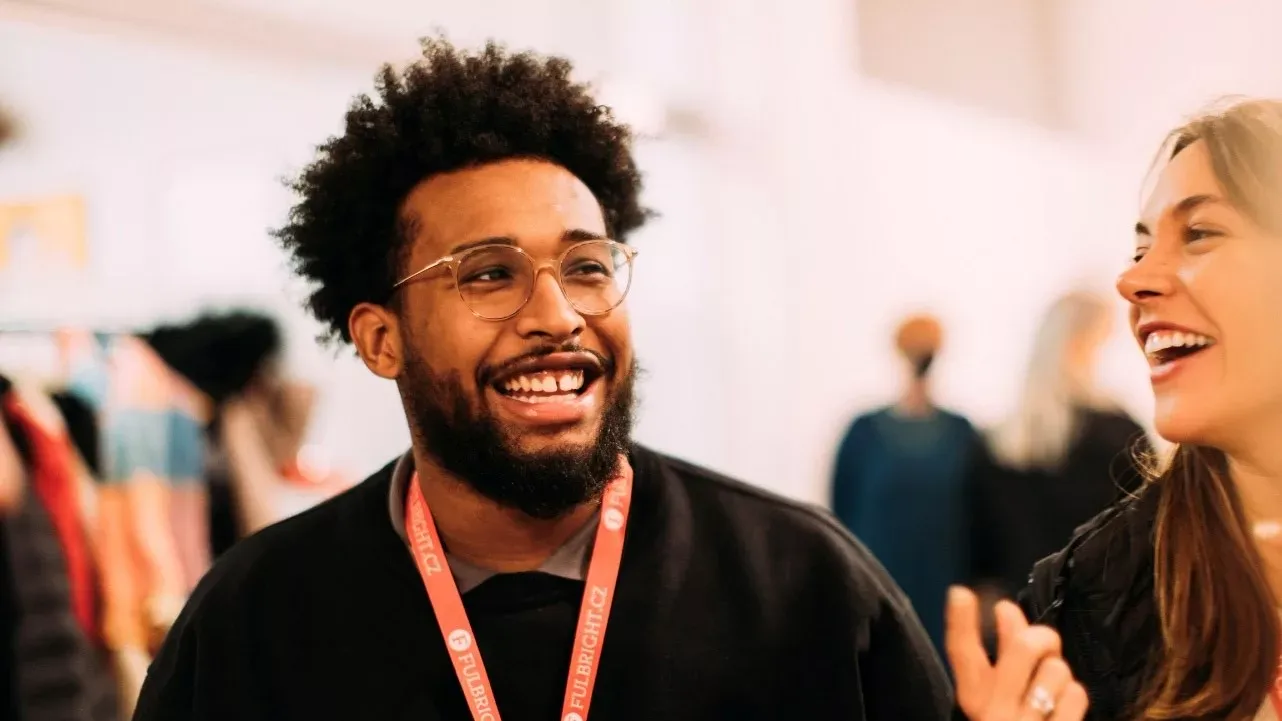Hunter Mack, Virginia State University
2021 Fulbright Student English Teaching Assistant to Czech Republic

Finding Common Ground: HBCU Graduate Hunter Mack Connects Cultures and Generations
As a student at Virginia State University, which was named a 2023 Fulbright HBCU Institutional Leader, playing American football and pursuing an engineering degree, Hunter Mack imagined himself working at an engineering job in Baltimore after graduation. Instead, he found himself teaching as a Fulbright English Teaching Assistant in a school in the Southern Bohemian region of the Czech Republic.
Mack says that his Honors College Dean, who is the Fulbright Program Adviser at Virginia State University, believed in him and gave him the confidence to apply to the Fulbright Program. “I wouldn’t have had a Fulbright without Dr. Roberts,” he says.
While on the Fulbright Program, Mack made the decision to further stretch himself to apply to graduate school. Now a Master’s student in electrical engineering at the University of Texas, his teaching experience brings new insight to his career goals. He is determined to work in an engineering field where he can continue to make an impact, the way he made an impact on his students’ lives as a teacher.
As the only African American among his group of U.S. Fulbrighters in the Czech Republic in 2021, Mack felt he had a special opportunity to share his culture with the community. He tried to give his Czech students a very different perspective of the United States from what they see on television. Mack’s undergraduate institution, Virginia State University, is an HBCU (Historically Black College and University), where 93% of the enrolled student population identify as Black or African American. When he arrived in the Czech village where he would live and teach, however, he noticed some people staring at him and taking pictures because they “had never seen someone like me before.” His understanding was that it “wasn’t that they didn’t like me,” and subsequently, Mack was encouraged by Czech people who “wanted to hear and listen to my experiences.”
He says the Fulbright Commission in the Czech Republic helped to prepare him for this experience, and gave him the support he needed to feel safe and to thrive in a situation that was outside of his comfort zone.



Drawing on family history and shared experiences
In the Czech Republic, Mack taught at a secondary school that focused on Technology and Sports Business, which he felt was a perfect match for his background as an engineering student and a college athlete. He found that having conversations about one another’s history and experiences, as well as finding common ground in shared interests like sports, allowed his students and the teachers and people in the community to wade into deeper conversations.
Working with his students on an oral history project, Mack discovered that a lot of their family members did not talk about the past, particularly the period following the coup d’etat of 1948. From the few students who were brave enough to talk to their grandparents about what they had gone through, he heard stories about some who had not been able to go to school, or to speak their native language. “It really just opened my eyes to the level of oppression that occurred” in the region.
He helped address a generational disconnect between his students, who grew up in a democracy, and their parents, who grew up under military-imposed communism.
“I felt that it was important that these kids talk to their parents and their grandparents to understand what they went through and why they were able to have the freedoms that they have now, because that’s something that I do, within my family,” he says. “My grandfather’s an immigrant, and my relatives grew up in the time of Jim Crow segregation. Talking to my older family members about the things that they went through during that time period gives me a better appreciation for the life that I’m living now.”
These connections gave him a different vantage point to share more about African-American experiences. “That was really powerful for me… We were able to have those kinds of conversations, those understandings on a deeper level.”
“I would say that … there is an absolute need to have diversity in this program, because we are representing America,” Mack reflects. “America is a diverse country and so it needs to be represented as such.”
Advice for HBCU Students
Asked what advice he would give to students at an HBCU who might be considering whether to apply to the Fulbright Program, Mack said, “100 percent, I would encourage them! I think Fulbright has opened a lot of doors for me.”
He recognized the great impact he had made when it was time to leave. “I’m able to see how happy they were that I was there to teach them, and how even maybe I changed their minds about people that look like me or I was able to give them insight into America, or a perspective that they would have never seen.
“And I think that that’s the beauty of this program. It’s like we are all individuals living in America and we all have our own stories and perspectives. We can bring that to another place, and we can change the perspectives in that place just by existing.
“And I think that’s really beautiful.”